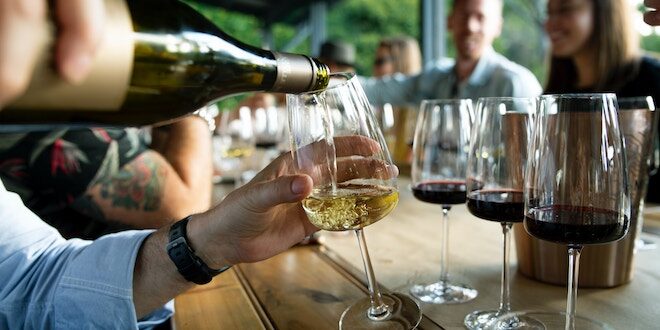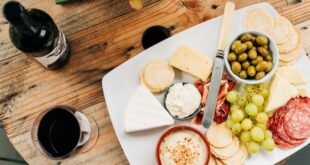Last Updated on October 4, 2023
Wine tasting can be a fun and educational experience for both beginners and wine connoisseurs alike. However, the first wine tasting experience can be a bit intimidating and overwhelming. With so many different types of wine and tasting techniques, it can be difficult to know where to start for those who have never participated in a wine tasting event before.
That’s why we’ve put together this article to provide 12 tips for your first wine tasting experience. These tips will help you feel more confident and comfortable during your first wine tasting, as well as give you the tools to fully appreciate and enjoy the wines you taste.
From knowing how to properly taste wine and recognizing different wine varieties to understanding wine regions and pairing food with wine, these tips cover all the essential aspects of wine tasting. Whether you’re attending a wine tasting event with friends or looking to expand your knowledge of wine, these tips will help you make the most out of your first wine tasting experience.
Helpful Steps to Take for Your First Wine Tasting
Research the winery
Research the winery and the wines they make before going to a class that holds wine tastings so you know what to expect. This information may help you better grasp the process of manufacturing wine and the many sorts of wines you may be tasting.
Dress appropriately
Since wine tasting are often conducted in vineyards or wineries, it is essential to wear attire suitable for both the setting and the weather. Because you will likely be wandering throughout the vineyard, you should wear comfortable shoes.
Don’t wear perfume or cologne
It is preferable to avoid wearing any strong odors when tasting wine since perfumes and colognes might interfere with a person’s ability to detect and taste the wine.
Taste with an open mind
Avoid forming strong opinions on wines you haven’t tasted before. Try each bottle of wine cold without making any assumptions.
Look at the wine
Take note of the wine’s hue and purity. You may learn a lot about the wine’s age and taste character just by looking at its hue.
Smell the wine
It would help if you gave it a thorough whiff to determine the wine’s flavors. The perfume of wine may tell you a lot about its taste and even point out any problems it may have.
Taste the wine
The wine should be sipped slowly and savored for a few seconds before being swallowed. See if you can pick out fruit, spice, or oak hints.
Don’t rush
When tasting wine, go slow and enjoy the experience. Savor each mouthful, and give yourself plenty of time to enjoy the wine’s full flavor.
Use the spit bucket
Guests are encouraged to utilize the offered spit bucket to prevent intoxication during a big wine tasting. Don’t feel like you have to down every glass of wine.
Take notes
Take notes on each wine as you taste it if you plan on sampling a variety. This might serve as a helpful reminder of which wines were favorites and which were duds.
Ask questions
Be bold and ask questions about the wine or the wine-making process. The staff at the winery are usually happy to share their knowledge and expertise.
Have fun
Wine tasting, above all else, is meant to be a pleasurable and lighthearted activity. Try not to overthink things and relax about getting everything “right.”
Factors to Consider About Wine
Alcohol content
The wine’s percentage of alcohol is an important consideration. There is a correlation between wine’s alcohol concentration and its perceived intensity and body, with higher-alcohol wines tending toward the former and lower-alcohol wines tending toward the latter.
Tannins
Tannins are a normal part of wine and may change how it tastes and feels. While wines with higher tannin levels tend to be more astringent and linger on the palate for longer, those with lower tannin levels tend to be more accessible and silky.
Acidity
The wine’s acidity may also affect how it tastes. Wines with greater acidity levels might be tangier and more refreshing, while wines with lower acidity levels can be rounder and more approachable.
Food pairing
It’s also crucial to consider the food you’ll serve with the wine. There are universal truths about which meals go well with certain wines.
Price
Some wines may be rather pricey, so it’s important to think about that. Remember that the price tag doesn’t necessarily indicate the product’s quality or flavor.
Benefits of Wine
Improved Digestive Health
Red wine’s polyphenols have been demonstrated to benefit digestive health by acting favorably on gut microbes. Polyphenols have anti-inflammatory properties, which may assist in enhancing gut health.
Cancer Prevention
In some research, antioxidants in wine have been linked to a reduced risk of developing breast and colon cancer. Resveratrol has been studied for its potential to inhibit the development and metastasis of cancer.
Stress Reduction
Moderate wine consumption has been linked to a decreased perception of stress and anxiety. Wine’s alcoholic content may enhance the release of serotonin, a neurotransmitter associated with emotions of contentment and well-being.
Conclusion
In conclusion, attending your first wine tasting might be intimidating, but with these 12-pointers, you’ll be ready to enjoy yourself and learn a lot. Keep an open mind, don’t rush anything, and enjoy yourself.
You may also like:
Wine Storage Ideas For Small Spaces
Top Wine Tour Destinations in California
Best Wines to Pair with Mexican Food
5 Best Wine Destinations Around the World
 Travel for Food Hub The Food Blog for Travel Lovers
Travel for Food Hub The Food Blog for Travel Lovers
















